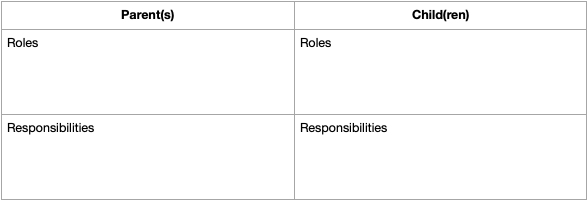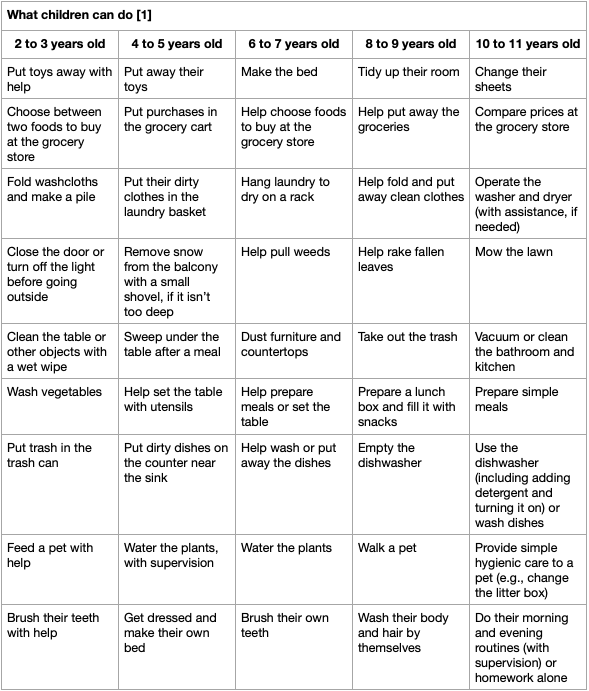Family roles and responsibilities
The importance of family roles and responsibilities
In a family, each person occupies one or more roles in relation to the other members of the family, giving them rights and obligations to assume certain family responsibilities.
As a parent, you are responsible for ensuring the proper development of your child by attempting to meet their daily needs.
To ensure that families function properly :
- Family members need to agree on how responsibilities are distributed, i.e. who does what at home.
- Responsibilities should be assigned according to each person’s age and ability.
- A family’s ability to remain flexible and adaptable regarding the roles and responsibilities of each of its members is important, especially during crisis or stressful situations.
- Any change that affects one family member can affect all the other members.
“Visualize a mobile suspended from the ceiling with four or five pieces gently moving in the air. The mobile as a whole is simultaneously in balance and in motion. Some pieces are moving rapidly; others are almost stationary. Some are heavier and their weight influences the direction of the mobile’s movement; others seem to go along for the ride. A breeze caught by one piece of the mobile immediately causes the other pieces to begin moving, some more than others. As the pace increases, some pieces lose their balance and move about chaotically for a time. Gradually, the mobile as a whole exerts its influence on the errant pieces and balance is restored, but only as a result of a concerted change in direction. Also consider the distance between the pieces, the effect they have when they touch and the importance of the vertical axis. Two pieces may move in coordination, while one piece may appear to be persistently isolated from the others; yet its position is essential to the balance of the entire system.” (Allmond et al.,1979).
When families are faced with a new situation that is particularly difficult or stressful (e.g., a depressive episode, death or physical illness), there may be some confusion about each family member’s responsibilities in the short term. The situation may require that responsibilities be reviewed and redistributed. To ensure that the family continues to function properly during these situations, it must be flexible and able to adapt to changes while respecting the age and capabilities of each individual.
We invite you to take a moment to reflect and identify the roles and responsibilities of each member of your family. To help you, you can choose a moment in your day (e.g., when your child returns home) and think about everyone’s roles and responsibilities during that time. Think about the types of responsibilities assigned and why they were distributed among your family members in this way. You can also think of specific ways to encourage your child to complete their daily tasks (e.g., positive reinforcement and use of play and music).

Specific ways to encourage my child to complete their tasks :
………………………………………………………………………………………………………………………………………………………………………………………………………………………………………………………………………………………………………………………………………………………………………………………………………………………………………………………………………………………………………………………………….
The challenge of ensuring that responsibilities are divided equitably within the family may grow during difficult, stressful or transitional times (e.g., leaving for school, after school and during travel). This is a common issue for most families.
My child’s responsibilities
“Personally, I have trouble giving my children responsibilities because it makes me feel guilty. I always think that a good mother is one who does everything and asks for nothing.” -Adela
Giving your child responsibility can be very beneficial to them. In addition to feeling useful, they learn to collaborate, help others and be more independent. These factors contribute to their self-esteem and development.
On the other hand, it is important to remember the kinds of responsibilities a child can take on.
- The nature and number of responsibilities that a child can take on evolves over time and depends on the child’s age, maturity, skills and ability to perform them.
- Each child develops at their own pace!
- As children grow and learn to perform tasks, they will need less supervision or support in performing them, as they will have become more independent.
- Keep an eye on what your child can do and support them in developing their independence. To do so, it can be helpful to discuss with your child which responsibilities they would like and not like to have and encourage them to share their feelings and limitations (e.g., when a task is too difficult).
- Some tasks require greater vigilance, such as those involving the safety and basic care of children. It is therefore recommended that the responsibility of supervising young children be given to a child who is at least 12 years old and who demonstrates the maturity required for this task.
Tasks appropriate for my child’s age
The table below shows examples of tasks that can be done by children according to their age. With the help of a parent, children can perform certain daily or household tasks at a young age. You can involve children under the age of three in daily tasks, but you will need to provide them with support and supervision.

It is important to be mindful of how responsibilities are distributed within the family. In addition to not assigning too many tasks, we suggest making sure that your child does not feel stressed or concerned about balancing their family responsibilities with their responsibilities as a child! For example, it’s good to make sure that children have enough time to have fun, do homework, see friends, play sports or pursue hobbies.
Beware of the parentification phenomenon. This phenomenon is characterized by the attribution of a parental role to one or more children in the family, i.e., the roles of parent and child are either partially or fully reversed. The child plays the role of the parent, e.g., the parent asks the child for advice, to prepare meals on their own or to fulfil responsibilities that are too advanced for them. This role reversal can be harmful to a child’s development – regardless of age – as their own needs are not being met. The role you play as a parent is fundamental and cannot be fulfiled by a child.
Tips
It may be a good idea to take a moment as a family to discuss how roles and responsibilities are distributed within the family and to note everyone’s responsibilities.
There may be times when you find it more difficult to fulfil your role, meet all your work, family and social obligations and responsibilities and divide tasks fairly within the family, especially when difficult situations arise. When this happens, you can call upon your resources and social network to help with daily tasks or provide you with the support you need. It’s a great way to prevent problems from arising within your family!
Click here if you would like to take an inventory of the people and resources that make up your support network.
A big thank you to Stephanie and Adela, parent members of the LaPProche advisory committee, for their collaboration and involvement in the developing of this fact sheet.
This content was developed at the Université du Québec en Outaouais by the Research and action laboratory for people with mental health problems and their loved ones (LaPProche) with funding from the Fonds des services aux collectivités (FSC2018-013) of the Ministère de l’Enseignement Supérieur and in collaboration with CAP santé mentale.
The information contained in this sheet does not replace seeking professional advice. If you have any questions or concerns, please see a professional.
References
Aldrige, Jo., & Becker, S. (2003). Children caring for parents with mental illness: Perspectives of young carers, parents and professionals. The Policy Press.
Allmond, B.W., Buckman, W. & Gofman, H. F. (1979). The family is the patient: An approach pediatrics for the clinician. Mosby.
Beardslee, W.R., Martin, J., & Gladstone, T. (2012) Family Talk preventive intervention manual. Boston Children’s hospital: FAMPOD. https://fampod.org/
Brigitte, R. (2008). La discipline, un jeu d’enfant. Éditions CHU Sainte-Justine.
Naître et Grandir. (2016). Quelles tâches ménagères confier à un enfant? https://naitreetgrandir.com/fr/etape/5-8-ans/vie-famille/fiche.aspx?doc=taches-menageres
Ferland, F. (2014). Le développement de l’enfant au quotidien de 6 à 12 ans. Éditions CHU Sainte-Justine.
Piché, G., Villatte, A., & Habib, R. (2019). Programme FAMILLE+. Manuel du parent [document inédit]. Université du Québec en Outaouais : Laboratoire de recherche et d’actions pour les personnes ayant des problèmes de santé mentale et leurs proches (LaPProche).
Piché, G., Villatte, A., Habib, R., & Vetri, K. (2019). Programme FAMILLE+. Manuel de l’enfant [document inédit]. Université du Québec en Outaouais : Laboratoire de recherche et d’actions pour les personnes ayant des problèmes de santé mentale et leurs proches (LaPProche).
Solantaus, T., & Ringbom, A. (2002). How Can I Help My Childrend : A Guide Book for Parents With Menatl Health Problems. (ouvrage original publié sous le tite de Miten autan lastani? Opas vanhemmille, joilla on mielenterveyden ongelmia. Picascript, Helsinki. Helsinki, Finland : Picascript.)
[1] Information from :
Brigitte, R. (2008). La discipline, un jeu d’enfant. Éditions CHU Sainte-Justine.
Ferland, F. (2014). Le développement de l’enfant au quotidien de 6 à 12 ans. Éditions CHU Sainte-Justine.
Allôprof Parents. (2017). Outil : quelles responsabilités donner à mon enfant? https://www.alloprofparents.ca/outils/
Naître et Grandir. (2016). Quelles tâches ménagères confier à un enfant? https://naitreetgrandir.com/fr/etape/5-8-ans/vie-famille/fiche.aspx?doc=taches-menageres
Piché, G., Villatte, A., & Habib, R. (2019). Programme FAMILLE+. Manuel du parent [document inédit]. Université du Québec en Outaouais : Laboratoire de recherche et d’actions pour les personnes ayant des problèmes de santé mentale et leurs proches (LaPProche).
To cite this document, please provide the following reference: LaPProche Laboratory. (2021). Parents living with a mental illness: Family roles and responsibilities. Université du Québec en Outaouais.
© LaPProche 2021| lapproche.uqo.ca
All rights reserved.
Any reproduction in whole or in part by any means whatsoever is prohibited without the written permission of LaPProche.































